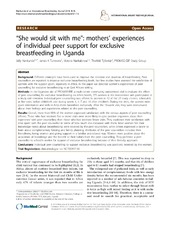| dc.contributor.author | Nankunda, Jolly | en_US |
| dc.contributor.author | Tumwine, James K. | en_US |
| dc.contributor.author | Nankabirwa, Victoria | en_US |
| dc.contributor.author | Tylleskär, Thorkild | en_US |
| dc.date.accessioned | 2010-12-13T09:36:57Z | |
| dc.date.available | 2010-12-13T09:36:57Z | |
| dc.date.issued | 2010-10-26 | eng |
| dc.Published | International Breastfeeding Journal 5:16 | en |
| dc.identifier.issn | 1746-4358 | |
| dc.identifier.uri | https://hdl.handle.net/1956/4335 | |
| dc.description.abstract | Background: Different strategies have been used to improve the initiation and duration of breastfeeding. Peer counsellors are reported to improve exclusive breastfeeding levels, but few studies have assessed the satisfaction of women with the support given, especially in Africa. In this paper we describe women’s experiences of peer counselling for exclusive breastfeeding in an East African setting. Methods: In the Ugandan site of PROMISE-EBF, a multi-centre community randomised trial to evaluate the effect of peer counselling for exclusive breastfeeding on infant health, 370 women in the intervention arm participated in a study exit interview. Individual peer counselling was offered to women in 12 of the 24 study clusters, scheduled as five visits: before childbirth and during weeks 1, 4, 7 and 10 after childbirth. During the visits, the women were given information and skills to help them breastfeed exclusively. After the 10-week visit, they were interviewed about their feelings and experiences related to the peer counselling. Results: Overall, more than 95% of the women expressed satisfaction with the various aspects of peer counselling offered. Those who had received five or more visits were more likely to give positive responses about their experience with peer counselling than those who had received fewer visits. They explained their satisfaction with time spent with the peer counsellor in terms of how much she discussed with them. Most women felt their knowledge needs about breastfeeding were covered by the peer counsellors, while others expressed a desire to learn about complementary feeding and family planning. Attributes of the peer counsellors included their friendliness, being women and giving support in a familiar and relaxed way. Women were positive about the acquisition of knowledge and the benefit to their babies from the peer counselling. They preferred a peer counsellor to a health worker for support of exclusive breastfeeding because of their friendly approach. Conclusions: Individual peer counselling to support exclusive breastfeeding was positively received by the women. | en_US |
| dc.language.iso | eng | eng |
| dc.publisher | BioMed Central | eng |
| dc.relation.ispartof | <a href="http://hdl.handle.net/1956/5607" target="blank">Individual peer counselling for exclusive breastfeeding in Uganda</a> | eng |
| dc.rights | Attribution CC BY | eng |
| dc.rights.uri | http://creativecommons.org/licenses/by/2.0 | eng |
| dc.title | “She would sit with me": mothers’ experiences of individual peer support for exclusive breast feeding in Uganda | en_US |
| dc.type | Peer reviewed | |
| dc.type | Journal article | |
| dc.description.version | publishedVersion | en_US |
| dc.rights.holder | Copyright 2010 Nankunda et al; licensee BioMed Central Ltd. This is an Open Access article distributed under the terms of the Creative Commons Attribution License (http://creativecommons.org/licenses/by/2.0), which permits unrestricted use, distribution, and reproduction in any medium, provided the original work is properly cited. | |
| dc.rights.holder | Nankunda et al; licensee BioMed Central Ltd. | |
| dc.identifier.doi | https://doi.org/10.1186/1746-4358-5-16 | |
| dc.subject.nsi | VDP::Medisinske Fag: 700::Helsefag: 800 | nob |

